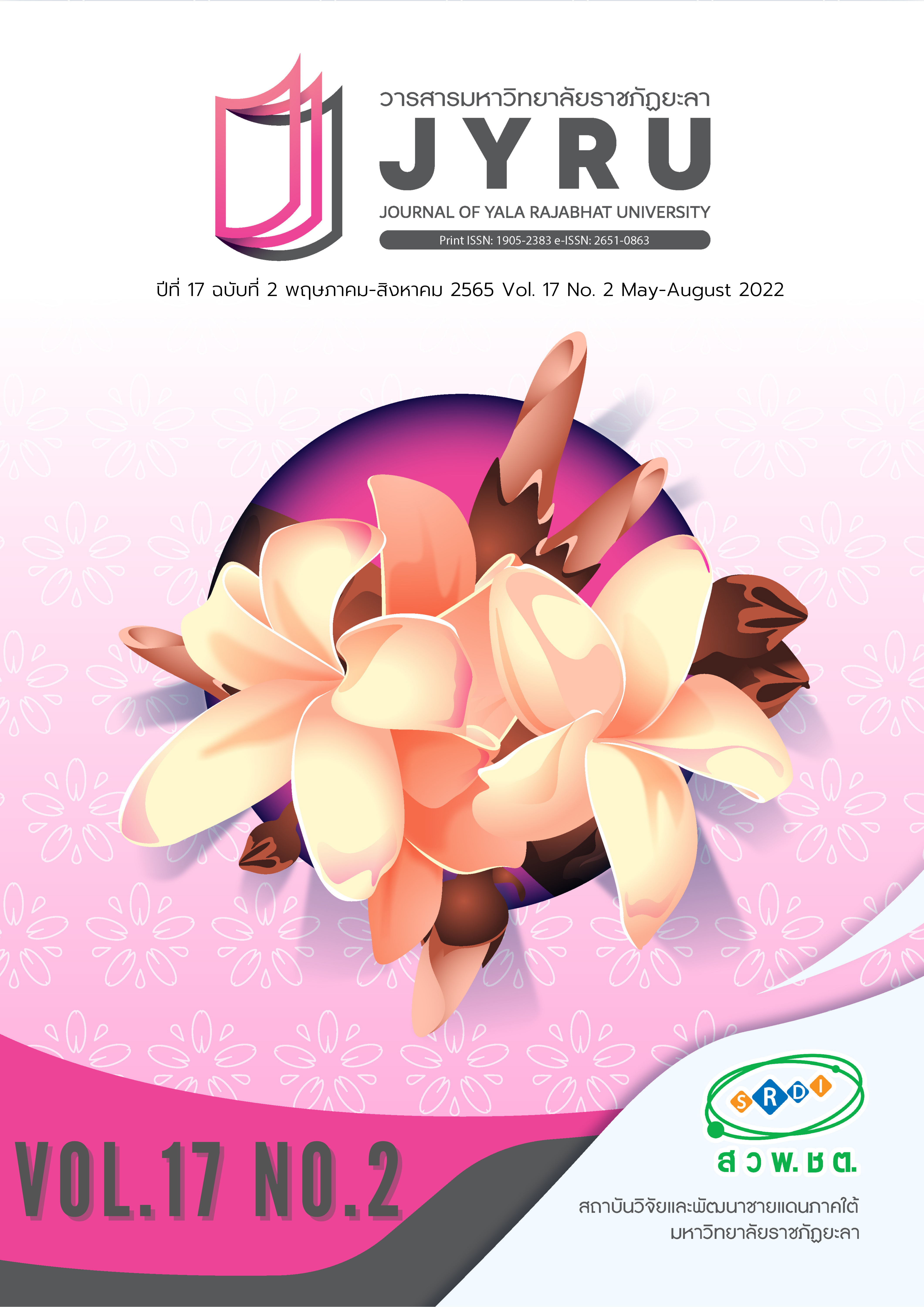การพัฒนารูปแบบการให้การศึกษาผู้ปกครองโดยกระบวนการมีส่วนร่วมเพื่อพัฒนาเด็กปฐมวัย : กรณีศึกษาการพัฒนาความฉลาดทางอารมณ์
Main Article Content
บทคัดย่อ
รูปแบบการให้การศึกษาผู้ปกครองในปัจจุบันไม่สอดคล้องกับลักษณะการเรียนรู้และความต้องการของผู้ปกครอง จึงได้มีการวิจัยและพัฒนาที่มีวัตถุประสงค์เพื่อ พัฒนารูปแบบการให้การศึกษาผู้ปกครองโดยกระบวนการมีส่วนร่วมเพื่อพัฒนาเด็กปฐมวัย และ ศึกษาประสิทธิผลของรูปแบบการให้การศึกษาผู้ปกครอง กลุ่มตัวอย่าง คือ ผู้ปกครองเด็กปฐมวัย จำนวน 20 คน เด็กปฐมวัย จำนวน 20 คน เครื่องมือวิจัย ได้แก่ แบบทดสอบความรู้ผู้ปกครองด้านการเสริมสร้างความฉลาดทางอารมณ์ของเด็กปฐมวัย แบบสังเกตความฉลาดทางอารมณ์ของเด็กปฐมวัย และแบบประเมินความพึงพอใจของผู้ปกครองที่มีต่อรูปแบบ ผลการวิจัยปรากฏว่า รูปแบบการให้การศึกษาผู้ปกครองโดยกระบวนการมีส่วนร่วมเพื่อพัฒนาเด็กปฐมวัยที่พัฒนาขึ้น มี 7 องค์ประกอบ และประสิทธิผลของรูปแบบการให้การศึกษาผู้ปกครอง มีดังนี้ 1) ผู้ปกครองที่ได้รับการจัดกิจกรรมตามรูปแบบ มีความรู้เกี่ยวกับการเสริมสร้างความฉลาดทางอารมณ์ของเด็กปฐมวัยสูงกว่าก่อนการใช้รูปแบบอย่างมีนัยสำคัญทางสถิติที่ระดับ .01 2) เด็กปฐมวัยที่ได้รับการจัดกิจกรรมจากผู้ปกครองที่ได้รับความรู้ผ่านรูปแบบการให้การศึกษาโดยกระบวนการมีส่วนร่วม มีความฉลาดทางอารมณ์ โดยรวมและรายด้านสูงกว่าก่อนการจัดกิจกรรมอย่างมีนัยสำคัญทางสถิติที่ระดับ .01 และ 3) ผู้ปกครองมีความพึงพอใจต่อรูปแบบการให้การศึกษาผู้ปกครองโดยกระบวนการมีส่วนร่วมระดับมากที่สุด ผลการวิจัยอธิบายได้ว่า รูปแบบการให้การศึกษาผู้ปกครองด้วยกระบวนการมีส่วนร่วมเป็นรูปแบบที่สามารถนำไปใช้ในการให้ความรู้พ่อแม่ผู้ปกครองเกี่ยวกับการส่งเสริมและพัฒนาเด็กปฐมวัยได้ จึงเป็นอีกทางเลือกสำหรับครูปฐมวัยและสถานศึกษา หรือหน่วยงานที่เกี่ยวข้องสามารถนำไปใช้ในการพัฒนาผู้ปกครองให้มีความรู้ได้อย่างมีคุณภาพ
Article Details

อนุญาตภายใต้เงื่อนไข Creative Commons Attribution-NonCommercial-NoDerivatives 4.0 International License.
บทความ ข้อมูล เนื้อหา รูปภาพ ฯลฯ ที่ได้รับการเผยแพร่ในวารสารมหาวิทยาลัยราชภัฏยะลานี้ ถือเป็นลิขสิทธิ์ของวารสารมหาวิทยาลัยราชภัฏยะลา หากบุคคลหรือหน่วยงานใดต้องการนำทั้งหมดหรือส่วนหนึ่งส่วนใดไปเผยแพร่ต่อหรือกระทำการใดๆ จะต้องได้รับอนุญาตเป็นลายลักษณ์อักษรจากวารสารมหาวิทยาลัยราชภัฏยะลาก่อนเท่านั้น
เอกสารอ้างอิง
Bureau of Academic Affairs and Educational Standards. Office of the Basic Education Commission, Ministry of Education. (2017). Early childhood curriculum b. e. 2560. Bangkok: Agricultural Cooperative Printing Demonstrations of Thai co., Ltd. (in Thai)
Burnard, P. (1996). Teaching the analysis of textual data: an experiental approach. Nurse Education Today, 16(4), 278-281.
Chaisalee, Ph. (2016). The participation and guidelines for development of parents in learning management at early childhood level in higher education institution demonstration schools under the office of the commissioner of private education, chon buri primary education service area office 1. Master’s Thesis. Burapha University. (in Thai)
Chuangcham, P. (2016). What is appreciative inquiry? [Online]. Retrieved October 16, 2017, from: http://www. med. nu. ac. th/dpMed/ 2015/?mod=knowledge&dep=14 (in Thai)
Cooperrider, D. L., & Whitey, D. (2005). Apperciative: a positive revolution in change. San Francisco: Berret-Koehler.
Erikson, E. H. (1993). Childhood and society. New York: Norton.
Freud, S. (2011). An outline of psychoanalysis. Mansfield Centre, CT: Martino Publishing.
Johnson, D. W., & Johnson, R. (1999). Learning together and alone: cooperative competitive and individualistic learning. (5th ed.). Boston: Allyn & Bacon.
Joyce, B., Weil, M. & Calhoun, E. (2015). Models of teaching. (9th ed.). Boston: Pearson.
Knowles, M. S., Holton, E. F., & Swanson, R. A. (2020). The adult learner: the definitive classic in adult education and human resource development. (9th ed.). Houston Texas: Gulf Publishing.
Kolb, D.A. (2015). Experientail learning: experience as the source learning and development. (2nd ed.). NJ, United States: Pearson FT Press.
Lvancevich, J. H., Donnelly, J. H., & Gibson, J. L. (1989). Management: principles and functions. (4th ed.). Boston, MA: Richard D. lrwin.
Office of the Council of State. (2019). Intent of the early childhood development act 2019. Bangkok: Office of the Council of State. (in Thai)
Office of the Education Council. (2017). National education plan 2017-2036. (2nd ed.). Bangkok: Prikwan Graphic co. Ltd. (in Thai)
Office of the National Economic and Social Development Board. (2017). Economic development plan and national society no. 12 (2017-2021). Bangkok: Office of the National Economic and Social Development Board. (in Thai)
Olsem, G. W., & Fuller, M. L. (2012). Home – school relations working successfully with parents and families. (4th ed.). Boston: Pearson.
Phanit, W. (2007). Contemplative learning: education as the path for spiritual searching. Bangkok: Suan-nguenmeena. (in Thai)
Phongthong, Th. (2016). The participation of parents in provision of early childhood education of schools in kaeng hang maeo district under chanthaburi primary education service area office 1. Master’s thesis. Burapha University. (in Thai)
Poolpatarachewin, Ch. (2012). The crystallization and explosive outcome experiences of contemplative mind and contemplative practices [Online]. Retrieved October 20, 2017, from: http://jitwiwat.blogspot.com/2012/06/blog-post_22.html. (in Thai)
Tejagupt, P. (2011). Instruction with child-centered focus concepts, methods, and teaching techniques. Bangkok: The Master Group Management. (in Thai)
Wasuphokin, S. (2011). Development of a self-directed learning model for parents to create social ability of autistic preschool children. Doctoral dissertation. Srinakharinwirot University. (in Thai)
Watkins, J. M., Mohr, B. J., & Kelly, R. (2011). Appreciative inquiry: change at the speed of imagination. (2nd ed.). San Francisco: Pfeifer.
Yakaew, Ch., Siriprichayakorn, R., Yok-in, J., Promlek, A., & Piyajitti, A. (2018). Behavioral the participation of parents in the promotion of early childhood learning the child development center eastern region. Journal of Science of Education and Human Development, 2(2), 1-14. (in Thai)


